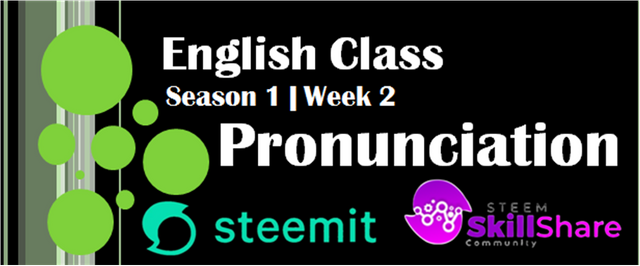Steem Skillshare - S1W2- Pronunciation- Homework Post for @ftz
Greetings to all.
Fulfilling the activities of the English course promoted in this great community, I present my second task related to pronunciation, which has been proposed by teacher @ftz.
I am happy to participate in this course that will help me to acquire new knowledge and I do not want to miss the opportunity to improve my skills in this very important language.
1. How many sounds are there in English?
In the English language the phonetic alphabet is made up of 12 vowel sounds, 8 diphthong or vowel union sounds, and 24 consonant sounds, which are represented by a different symbol.
Considering the above, we can say that in English, we have an alphabet of 26 letters and a phonetic alphabet of 44 sounds.
2. Classify the sounds and give examples of each.
As indicated previously, in English there are three types of phonemes, the vowel, the diphthong and the consonant.
2.1 Vowel phonemes:
In English we have four important vowel sounds to highlight:
/ ə: / Schwa: It is a very common phoneme in English and we find it in many words. It is a reduced vowel, often in the final syllable. We also find it in some words in which it is the only vowel and is between two consonants. Examples: father / ˈfɑːðə (r) / (father), mother / ˈmʌðə (r) / (mother).
It is also present in a closed syllable that is not stressed. Examples: president / ˈprezɪdənt / (president), experiment / ɪkˈsperɪmənt / (experiment).
Associated with the grapheme 'o' preceded by w and followed by r. Examples: word / wɜː (r) d / (word), world / wɜː (r) ld / (world).
/ ʌ /: This phoneme is a short vowel close to 'a'. Often in English it is associated with the grapheme 'o' before consonants 'w' or 'c' and after 'n'. Examples: onion / ˈʌnjən / (onion), wonderful / ˈwʌndə (r) f (ə) l / (wonderful), Money / ˈmʌni / (money), monk / mʌŋk / (monk), month / mʌnθ / (month), summer / ˈsʌmə (r) / (summer), up / ʌp / (over), to cut / kʌt / (cut).
/ i: / Long vowel. Examples: to be / biː / (ser), English / ˈɪŋɡlɪʃ / (English), sea / siː / (mar), evil / ˈiːv (ə) l / (evil), feet / fiːt / (feet), team / tiːm / (team), stream / striːm / (stream), cream / kriːm / (cream).
/ i / Short vowel of closed stressed syllables. Examples: Kidney / ˈkɪdni / (kidney), kit / kɪt / (kit), minute / ˈmɪnɪt / (minute), to hit / hɪt / (to hit), in / in / (in).
2. 2 Diphthongs phonemes:
The diphthong is the meeting of two different and consecutive vowel sounds in the same syllable. In Spanish, we are used to the fact that, “two vowel sounds correspond to the existence of two vowels, but in English, there can be a single vowel that is pronounced with two different and consecutive vowel sounds, lake (leik), fine (fain ), ... and there we find diphthongs.
/ ei /
This diphthong is generally associated with the following graphemes: 'a' for cake, 'ai' for brain, 'ay' for play, 'ei' for eight, 'ey' for they, 'ea' for break. Examples: Way, / wei / (street, street), to say, / to sei / (say), main, / mein / (main), lane, / lein / (lane, street), face, / feis / ( face), day, / dei / (day).
/ai/
Diphthong in open stressed syllables, associated with the grapheme ‘i‘ if it is followed by ld, nd, gh, gn. Examples: mild / maild / (mild), night / nait / (night), fight / fait / (fight), right / rait / (right), high / haɪ / (high), mind / maind / (mind).
With the ‘i‘ followed by ‘r‘ in open syllable. Examples: hire / 'haɪэ (r) / (hire), fire /' faɪэ (r) / (fire), to require / rɪ'kwaɪэ (r) / (require).
Consonant phonemes:
In English, English consonants can be grouped into two categories, voiced consonants and voiceless consonants; The former use the voice, that is, they make a vibration in our vocal cords; while deaf consonants are those that do not use the voice and generally only produce a short explosion of air in our mouth using the lips or the tongue.
We can notice these differences between consonants with examples of how regular verbs end in the past tense / d /, / t /, / id /, and plural nouns / s /, / z /, / ez /.
Voiced consonants:
Voiced "d"
join / joi’n ’/
joined / joi’nd ’/
live / li’v ’/
lived / li’vd ’/
Sound "id"
cntruct / with-struc’t ’/
contructed / con-struc’t’id ’/
decide / dE-sI’d ’/
decided / dE-sI’d’id ’/
Voiced "z"
key / k’E ’/
keys / k’Ez ’/
dog / do’g ’/
dogs / do’gz ’/
Sonorous "ez"
watch / wat’ch ’/
watches / watch’ez ’
Voiceless Consonants:
Deaf "t"
match / mat’ch ’/
matched / mat’ch’t ’/
ask / as’k ’/
asked / as’k’t ’/
"S" deaf
treat / trea’t ’/
treats / treat’s ’/
desk / des’k ’/
desks / desk’s ’/
3. Research the two categories of sounds I mentioned and write briefly what you learn about them.
Vowel sounds are those that occur without any obstruction occurring in the vocal cord, and consonant sounds are sounds that are produced by blocking air in the mouth.
Thankful for the opportunity to participate in this course that will help me improve my knowledge of the English language. Here is the link of the course:
Steem Skillshare English Class | Season 1 | Week 2 | Pronunciation
Greetings to the Steem Skillshare community moderator team (@steem.skillshare): @milakz, @daytona475, @arie.steem, @abu78, @ftz, @dwarrilow2002 and @jenesa.


que bueno no estaba enterada de este tipo de información y la realización de tareas. suerte y te pongan buena nota o te den buena remuneración